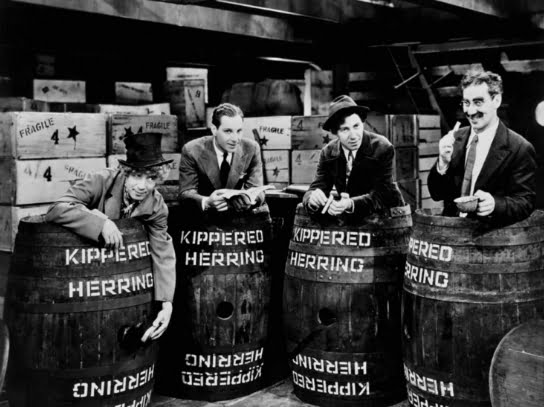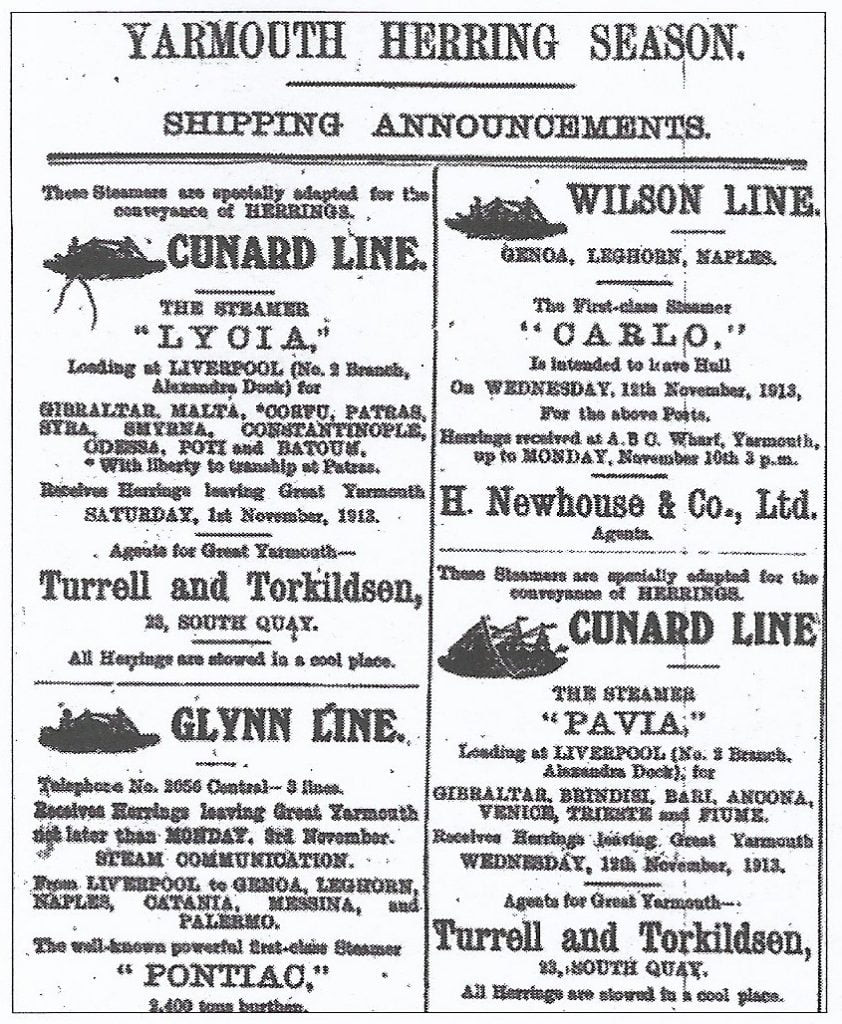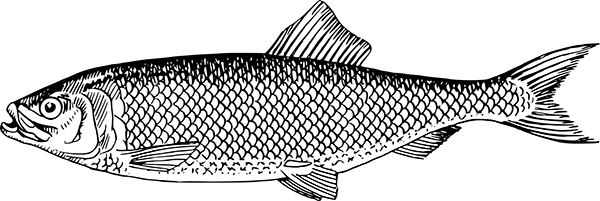Discovering The Marx Brothers in kipper barrels on a liner may not have been so improbable, but the dialogue makes up for any accidental plausibility
MONKEY BUSINESS

The Marx Brothers film Monkey Business (1931) has them as four stowaways on an ocean liner bound for New York. The titles appear over a barrel. In the opening credits their faces are superimposed on four barrels rolling down the gang plank and on to the New York docks.
The captain is told of the stowaways, who’ve been heard singing Sweet Adeline in the hold. We see four kippered herring barrels, out of which we hear the stowaway immigrants singing in barbershop close harmony.
It’s possible some might doubt the likelihood of an ocean liner carrying barrels of kippered herring, but newspaper adverts from 1913 illustrating Christopher Unsworth’s excellent The British Herring Industry: The Steam Drifter Years, 1900 – 1960 (2013) confound the sceptics.
The Mediterranean trade – admittedly focused on red, golden and silver herring – made regular use of Cunard’s and other company liners. The offer of cool storage notwithstanding, kippers might not have been at their best after a transatlantic crossing, but American audiences might not have been so familiar with the more heavily smoked herring products.

Harpo, Zeppo, Chico and Groucho emerge from the barrels, regardless. They lift the lids off the barrels, and the mayhem begins.
GROUCHO: Ah, this is the only way to travel, boys, the only way… I was gonna bring along the wife and kiddies, but the grocer couldn’t spare another barrel.
CHICO: I was goin’ to bring my grandfather, but there’s no room for his beard.
GROUCHO: Why don’t you send for the old swine and let his beard come later?
CHICO: I sent for his beard.
GROUCHO: You did?
CHICO: Yeah, it’s a coming by hairmail.
It’s not really appropriate to intellectualise a Marx Brothers film, but from their first appearance there is a constant play between immigrant and all-American tropes.
In the USA herring is overwhelmingly associated with the Jewish community – and the Marx Brothers were the sons of French and German Jewish immigrants. Making the herrings kippered pushes things towards a British grocer. And Sweet Adeline is a classic of the American barbershop tradition.
There are rival gangsters on the liner. Joe Helton is coming back from Europe with his daughter – providing the love interest for Zeppo. Alky Briggs is trying to take over Helton’s territory, but his wife, Lucille (played by comedian Thelma Todd), has no fun at all as a gangster’s moll: From the moment he got the marriage licence, I’ve led a dog’s life / Are you sure he didn’t get a dog licence?
Like Groucho, she wants excitement; she wants the ha-cha-cha-cha. Neither of the gangsters are Italian-background, as one might have expected, but then Chico is Italian…
GROUCHO: A fine sailor you are.
CHICO: You bet I’m a fine sailor. You know my whole family was
a-sailors? My father was-a partner with Columbus.GROUCHO: Well, what do you think of that, eh? Your father and
Columbus were partners?CHICO: You bet.
GROUCHO: Columbus has been dead for four hundred years.
CHICO: Well, they told me it was my father.
GROUCHO: Well now, just hop up there, little Johnny, and I’ll show
you a few things you don’t know about history… Now, there’s Columbus.CHICO: That’s-a Columbus Circle.
GROUCHO: Would you mind getting up off that fly-paper and giving the flies a chance?
CHICO: Aw, you’re crazy. Flies can’t read papers.
GROUCHO: Now, Columbus sailed from Spain to India looking for a short cut.
CHICO: Oh, you mean strawberry short cut.
GROUCHO: I don’t know. When I woke up, there was the nurse taking care of me.
CHICO: What’s the matter? Couldn’t the nurse take care of herself?
GROUCHO: You bet she could, but I found it out too late. Well, enough of this. Let’s get back to Columbus.
CHICO: I’d rather get back to the nurse.
GROUCHO: So would I. But Columbus was sailing on his vessel…
CHICO: On his what?
GROUCHO: Not on his what – on his vessel. Don’t you know what a
vessel is?CHICO: Sure. I can vessel. (Whistles ‘Sugar in the Morning’)
GROUCHO: Do you suppose I could buy back my introduction to you?… Now, one night Columbus’ sailors started a mutiny…
CHICO: Naw, no mutinies at night. They’re in the afternoon. You know, mutinies Wednesdays and Saturdays.
GROUCHO: There’s my argument. Restrict immigration.
The Marx Brothers’ father makes a cameo appearance in the film,
sitting on the luggage behind them when they make it to the New York docks (and was apparently paid $25 for two days work).
Producer Herman Mankiewicz warned the writers SJ Perelman and Will B Johnstone that the brothers were mercurial, devious, and ungrateful… I hate to depress you, but you’ll rue the day you ever took the assignment. This is ordeal by fire, make sure you wear asbestos pants.
Groucho thought the first script stank and later said of Perelman, I hated the son of a bitch, and he had a head as big as my desk. He considered Perelman was too intellectual for their kind of comedy and the thematic play around immigration may be the surviving evidence for that. For his part Perelman excised all mention of the film from his official publicity.
But it’s a great film and has the distinction of having been initially banned in Ireland for fear that it would encourage anarchic tendencies.
